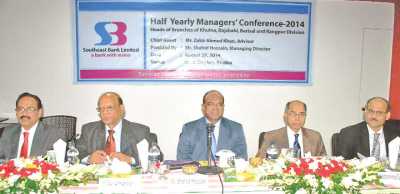Bangladesh Bank Governor Atiur Rahman has instructed the BASIC Bank new board of directors to remain vigilant from the outset in a bid to restoring goodwill of the bank.
He also warned the board members that the government and the central bank no longer want to see the repetition of banking failure.
The instructions came at an orientation meeting that Bangladesh Bank held with the BASIC Bank board of directors yesterday at its headquarters in the capital.
Criticising the previous board, the governor said the bank went through a troublesome situation due to their sheer irresponsibility of management and lending and non-compliance with the rules.
As a result, Bangladesh Bank and the Finance Ministry had to take strong action against them, he said.
He asked the board to submit the restoration plan, following the central bank instruction.
The board was also asked to follow prudent guidelines, remain active in monitoring and recovering loans, mete out exemplary punishment to corrupt officials and follow an appropriate policy for promotion.
He said the central bank has taken some long-term preventive actions in the wake of recent serious violations of loan disbursement.
The disbursement was made capitalising on the weakness of corporate governance and financial management.
He called upon the board to strengthen the bank’s loan discipline, internal audit and controlling frameworks.
The last five-year capital growth rate in the banking sector is 139% which indicates the ability of risk management, but it is not true for all banks, the governor said, referring to the capital shortfall of BASIC.
The bank suffered the capital shortfall of Tk1372 crore in June this year, and the central bank asked it to make up the shortfall amount by June 2015.
The central bank recently signed a memorandum of understanding with the BASIC bank, setting out a series of conditions.
The BASIC board was instructed to bring down its classified loan to 15% by June 2015 of its total outstanding loan which was 40.77% as of June this year.
News:Dhaka Tribune/30-Aug-2014




